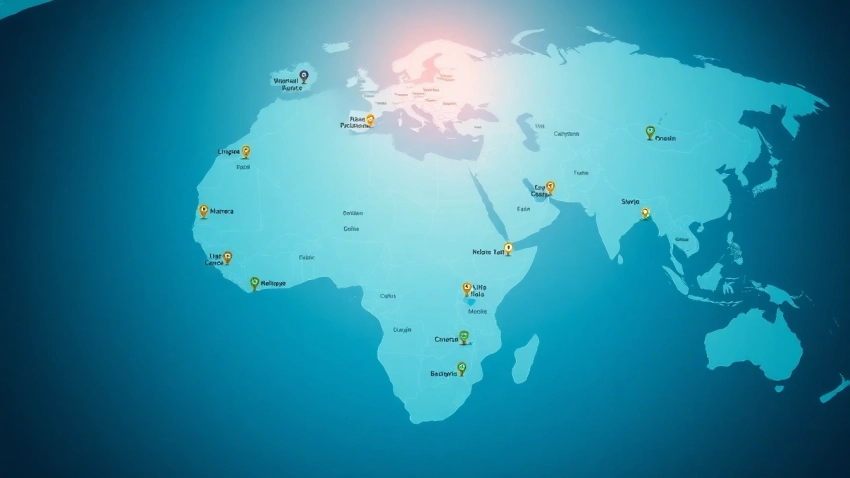
Russia in Africa 2025: Shaping New Alliances for Economic Growth and Stability
The Rise of Russia in Africa 2025
In recent years, the landscape of international relations has transformed dramatically. Amidst these changes, one nation is making significant strides in strengthening its presence on the African continent. This is evident through various initiatives and partnerships, especially with the approach of major global events. The Russia in Africa 2025 strategy is a pivotal element driving this engagement. Understanding the dynamics of this rise calls for an exploration of historical contexts, current political landscapes, and the impact of global dynamics.
Understanding Historical Context
The relationship between Russia and Africa is not a new phenomenon. Since the mid-20th century, ties have evolved from a backdrop of anti-colonial support during the Cold War to contemporary economic and political partnerships. Russia’s historical engagement in Africa included military aid to liberation movements and subsequent trade agreements that laid the foundation for today’s partnerships.
In the 21st century, as Africa began to rise economically, Russia sought to leverage its long-held relationships and expand its footprint in the region. By 2019, the first ever Russia-Africa Summit was held in Sochi, demonstrating a commitment to deepening these ties through cooperative frameworks covering politics, economics, and culture.
Current Political Landscape
The political climate in Africa has shifted dramatically, with many nations keen on diversifying their international partnerships beyond traditional Western allies. Russia, capitalizing on this shift, has established a more pronounced role through diplomatic missions, arms deals, and political alliances that reflect mutual values and interests.
As tensions escalate between Russia and Western countries, especially following the conflicts in Ukraine, African nations find themselves in a strategic position to balance relations with both sides. This has led to increased attendance at forums like the Eastern Economic Forum and willingness to engage in Brazil, Russia, India, China, and South Africa (BRICS) initiatives, which Russia actively promotes.
Impact of Global Dynamics
The geopolitical landscape influences Africa’s relationships with global powers. Russia’s increasing assertiveness is juxtaposed with rising tensions with the United States and Europe. As sanctions hinder Russia’s economy, it seeks to pivot towards Africa as a means of circumventing these restrictions and fostering economic growth.
Moreover, the emergence of multipolarity in global power dynamics prompts African nations to explore partnerships that offer development without the strings often attached to Western aid. This shift towards agency and self-determination resonates with Russia’s narrative, allowing it to project soft power through cultural diplomacy and economic investment.
Strategic Partnerships: Key Players
Analyzing Russia’s Trade Agreements in Africa
General trends indicate an uptick in trade relations between Russia and African nations. In 2022, trade volume between Russia and Africa reached approximately $18 billion, with mineral resources, energy, and military equipment dominating the export portfolio. For instance, Russia has supplied Algeria and Egypt with fighter jets, showcasing its role as a critical defense partner on the continent.
Furthermore, agreements on oil and gas exploration, particularly with resource-rich nations like Angola and Nigeria, highlight Africa’s role as a vital resource partner in Russia’s strategic outlook. The establishment of joint ventures fosters not only economic collaboration but also technological transfer, which is seen as a notable advantage for African nations.
Spotlight on Cultural Exchanges
Cultural diplomacy plays a crucial part in enhancing relations between Russia and Africa. Educational exchanges, scholarships for African students to study in Russia, and cultural festivals have been instrumental in fostering goodwill and long-term ties.
Russian cultural institutions are actively engaged in promoting arts, literature, and language, which not only boosts mutual understanding but also paves the way for more robust political dialogues. Through initiatives like the “Russkiy Mir” Foundation, Russia seeks to extend its cultural influence, thus broadening its sphere of soft power in Africa.
The Role of BRICS in Strengthening Ties
The BRICS alliance serves as a favorable platform for fostering economic partnerships and political allegiances between Russia and Africa. With the inclusion of nations like South Africa, BRICS emphasizes the collective vision of emerging economies to reshape the global financial system.
In the 2023 BRICS summit, held in South Africa, discussions revolved around trade, investment, and the establishment of a common BRICS currency. This initiative aims to reduce dependency on the US dollar in international transactions, which could be advantageous for African nations experiencing currency volatility.
Additionally, BRICS promotes infrastructure development across member nations, further solidifying Russia’s commitment to investment in African nations. Such engagements are reflected in projects like the construction of schools, hospitals, and transport networks that ultimately advance local economies.
Economic Opportunities and Challenges
Prominent Sectors for Collaboration
Several sectors present lucrative opportunities for collaboration between Russia and African nations. Energy remains a key area: partnerships in oil and gas exploration, nuclear energy development, and renewable energy initiatives are critical for enhancing energy access and security across Africa, exemplified by Russia’s involvement in building nuclear facilities in Egypt.
Mining and agriculture also represent significant avenues. Russian investments in agriculture aim to bolster food security in countries like Sudan, while mines in Zimbabwe and the Democratic Republic of Congo exemplify the exploitation of rich mineral deposits – a mutual benefit for both parties.
Potential Economic Risks
While the opportunities are promising, several risks arise. The heavy reliance on Russian investments puts African nations at risk, particularly if international sanctions against Russia escalate or if geopolitical tensions disrupt trade flows. Additionally, the lack of transparent governance and regulatory frameworks in some African countries could pose challenges for Russian businesses, potentially leading to disputes or economic losses.
Furthermore, there is an emerging concern regarding resource nationalism in countries where local populations demand higher stakes or benefits from foreign investment. These tensions could complicate bilateral relations and pose a risk to sustained economic activity.
Case Studies: Successful Ventures
Several successful ventures illustrate the potential benefits of Russia-Africa partnerships. For instance, Russia’s collaboration with South Africa in the nuclear energy sector has yielded significant dividends. The Pebble Bed Modular Reactor project, although faced with challenges, has fostered knowledge exchange and technological advancement in the energy field.
In addition, the establishment of the Russian-Angolan Mining Company showcases how well-structured ventures can successfully tap into Africa’s resource wealth while providing economic benefits to local communities through job creation and infrastructure development.
Geopolitical Implications of Russia’s Expansion
Responses from Western Nations
The resurgence of Russian influence in Africa has prompted alarm from Western nations, particularly the United States and European powers. Their responses have included economic sanctions against Russia and diplomatic efforts to counter its narrative by portraying partnerships as exploitative.
Efforts by the US to renew focus on Africa, often termed as the “new scramble for Africa,” reflect a desire to present a counter-narrative to Russia’s expansion, but success largely depends on addressing the genuine needs of African nations in terms of development, rather than merely countering Russian influence.
Regional Reactions and Alliances
The rise of Russian partnerships has led to regional alignments, with nations wanting to capitalize on the diversification of their foreign relations. For instance, countries like Uganda and Tanzania have expressed inclination towards engaging with Russia based on shared interests in defense and resource extraction, citing the ability of such alliances to bolster their negotiating powers against Western dominance.
Conversely, nations wary of Russian intentions often seek to bridge ties with Western nations, creating a complex geopolitical environment where strategic balancing becomes paramount.
Future Projections: What’s Next?
Looking towards 2025 and beyond, it appears that Russia’s strategy will focus on solidifying existing partnerships while exploring new avenues of engagement. This will likely involve enhancing the capacity for skill development in various sectors and continuing cultural exchanges to enrich bilateral ties.
Moreover, as Russia works towards bolstering its global standing, it will need to navigate emerging challenges such as climate change and health crises, ensuring that partnerships reflect a sustainable and inclusive development model that resonates with African priorities.
Conclusion: The Future of Russia in Africa 2025
Key Takeaways
The evolution of Russia’s presence in Africa reflects a complex interplay of historical ties, current geopolitical dynamics, and emerging opportunities for economic growth. As previously established relationships mature into strategic alliances, both Russia and African nations can expect to engage in a long-term collaboration that is mutually beneficial.
Long-term Impact Assessment
It will be imperative to assess the long-term impacts of these evolving partnerships. Factors such as governance, local socio-economic conditions, and regional stability will dictate the success of these alliances. Continuous dialogue and transparency will be critical in aligning interests and achieving sustainable outcomes.
Strategies for Effective Engagement
For successful engagement, it is crucial that both Russian and African leaders embrace inclusive strategies that recognize the aspirations of local populations. Collaborative frameworks that promote technology transfer, infrastructure development, and capacity building can foster a more enduring partnership that offers significant advantages for all stakeholders involved.












Leave a Reply